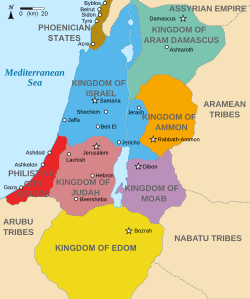Ammon
| Kingdom of Ammon | ||||||||
| Kingdom | ||||||||
|
||||||||
|
Ammon and its neighbors, around 830 BC
|
||||||||
| Capital | Rabbath Ammon (Amman)1 | |||||||
| Languages | Ammonite, Moabite | |||||||
| Religion | Milkomite | |||||||
| Government | Monarchy | |||||||
| King | ||||||||
| • | Around 1000 BC | Hanun | ||||||
| • | 740–720 BC | Sanipu | ||||||
| • | 680–640 BC | Amminadab I | ||||||
| Historical era | Iron Age | |||||||
| • | Kingdom of Ammon flourishes | 10th century BC | ||||||
| • | Battle of Qarqar against the Assyrians | 853 BC | ||||||
| • | Invasion by Alexander the Great | 332 BC | ||||||
| • | Rabbath Ammon renamed to Philadelphia | 248–282 BC | ||||||
|
||||||||
| Today part of |
|
|||||||
Ammon (Hebrew: עַמּוֹן, Modern Ammon, Tiberian ʻAmmôn; "People"; Arabic: عمّون, translit. ʻAmmūn) was an Iron Age Semitic-speaking nation occupying the east of the Jordan River, between the torrent valleys of Arnon and Jabbok, in present-day Jordan. The chief city of the country was Rabbah or Rabbath Ammon, site of the modern city of Amman, Jordan's capital. Milcom and Molech (who may be one and the same) are named in the Hebrew Bible as the gods of Ammon. The people of this kingdom are called "Children of Ammon" or "Ammonites".
The first mention of the Ammonites in the Bible is in Genesis 19:37-38. It is stated there that they descended from Ben-Ammi, a son of Lot through incest with his younger daughter. Bén'ámmî, literally means "son of my people". After the destruction of Sodom and Gomorrah, the daughters of Lot had sexual relations with their father, resulting in Ammon and his half brother, Moab, being conceived and born. This narrative has traditionally been considered literal fact, but is now generally interpreted as recording a gross popular irony by which the Israelites expressed their loathing of the Moabites and Ammonites, although it is doubtful that the Israelites would have directed such irony to Lot himself.
...
Wikipedia

